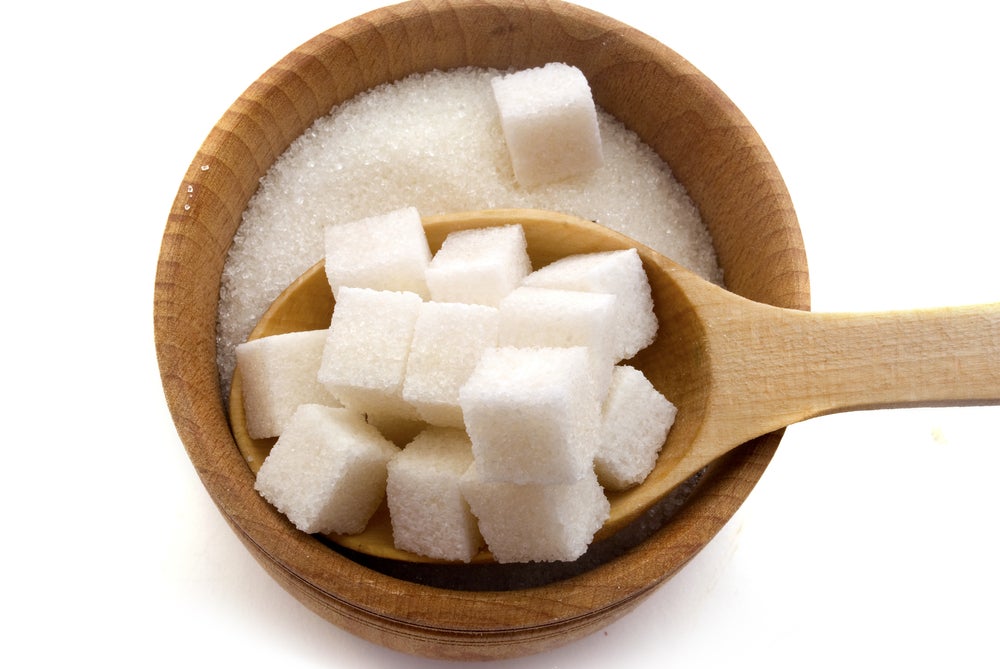Artificial Sweeteners: Better Than Sugar?

Photo: <a href=http://shutterstock.com>Shutterstock.com</a>
The jury’s still out.
Sugar is not inherently bad, but it’s easy to eat too much of it, and most Americans eat too much sugar. In fact, the average American gets 17 percent of his or her daily calories from sugar. The problem with eating so much sugar is that sugar provides a lot of calories without a lot of satiety. You can easily consume several hundred calories of sugar in one sitting and still be hungry afterward. For this reason, sugar promotes fat accumulation more than any other nutrient.
Nearly half of the sugar that the average person eats comes from beverages including energy drinks, sodas, and coffee drinks. Zero-calorie artificial sweeteners such as aspartame were created to help people reduce the number of calories they consume in beverages. But do they really work? That depends on how we define “work”. If working means simply reducing the number of calories consumed in beverages, then of course zero-calorie artificial sweeteners work. One 12-ounce can of Pepsi contains 150 calories, all of which come from sugar. A 12-ounce can of Diet Pepsi, sweetened with aspartame, contains zero calories. But if working means helping people consume fewer calories overall in their diet, lose excess body fat, and maintain a healthy body weight—well, that’s not so clear.
RELATED: Are “Natural Sweeteners” Really A Healthy Alternative?
Get the latest in triathlon training, gear, nutrition and news sent straight to your inbox. Sign up for Triathlete’s newsletter.
A 2011 scientific review of past studies on the effects of artificial sweeteners sought to determine whether they work in this second sense of not. The authors of the review analyzed the results of 53 studies involving 1,126 participants. Two of these studies compared the effects of including beverages containing sucrose sugar in the diet and substituting these with non-caloric alternatives on total daily energy intake. They found that subjects consuming the drinks sweetened artificially consumed 250 to 500 fewer total calories throughout the course of the day. Another study compared the effects of sucrose-sweetened and artificially sweetened beverages on body mass index over a period of several weeks. This study found that BMI was slightly reduced by a switch to noncaloric beverages, while drinking sugary beverages produced a slight increase in BMI.
It’s not a lot of evidence, but it does seem to favor the idea that drinking beverages sweetened with zero-calorie sugar alternatives reduces total daily caloric intake and helps promote a healthier bodyweight. However, there is a big difference between the clinical environment in which the above-described studies were conducted and the real world. Epidemiological studies in which large numbers of people have been surveyed about their diet and also placed upon scales and weighed have found that people who consume diet soft drinks regularly are just as fat as people who consume regular soft drinks and are fatter than people who consume neither sugar-sweetened nor artificially sweetened soft drinks.
RELATED – Eat And Run: Watching Sugar Intake
There are a couple of theories to explain this observation. One is that people who drink soft drinks tend to have bad overall diets. So it’s not the diet soft drinks per se that are responsible for fattening those who drink them but the association of these drinks with other foods in the diet. In other words, people who drink diet soft drinks are more likely to eat potato chips than people who avoid all soft drinks. A second theory is that artificial sweeteners promote weight gain by tricking the brain into increasing appetite.
So, where does this leave us? Clearly, the best thing we can do to control our bodyweight is avoid both sugar-sweetened and artificially sweetened drinks altogether. But what about the person who is currently somewhat dependent on regular consumption of sugary drinks and is considering replacing them with zero-calorie alternatives? The most we can tell this person is that making the switch can’t hurt and it might help a bit, but one shouldn’t expect too much from the change. Better results are likely to come from an outright reduction in the consumption of sweet-tasting drinks and an effort to clean up the rest of one’s diet.
****
About The Author:
Matt Fitzgerald is the author of numerous books, including Racing Weight: How To Get Lean For Peak Performance (VeloPress, 2012). He is also a Training Intelligence Specialist for PEAR Sports. To learn more about Matt visit www.mattfitzgerald.org.